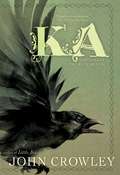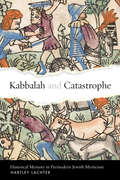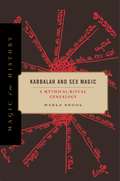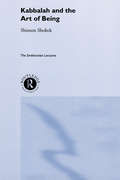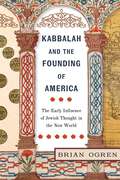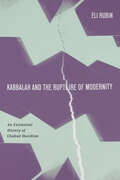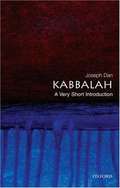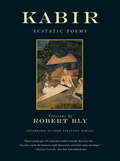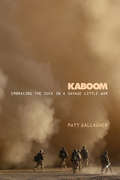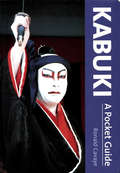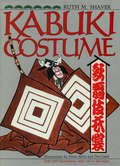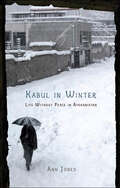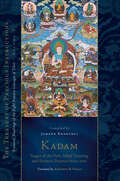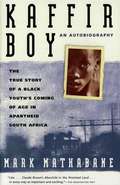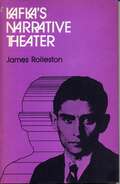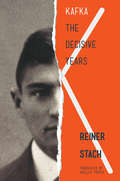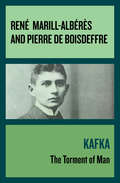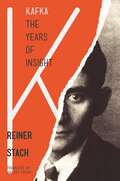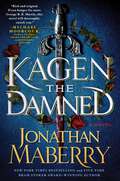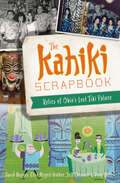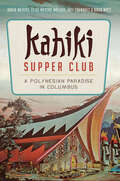- Table View
- List View
Ka: Dar Oakley in the Ruin of Ymr
by John Crowley Melody Newcomb“One of our country’s absolutely finest novelists.” —Peter Straub, New York Times bestselling author of Interior Darkness and Ghost Story From award-winning author John Crowley comes an exquisite fantasy novel about a man who tells the story of a crow named Dar Oakley and his impossible lives and deaths in the land of Ka.A Crow alone is no Crow. Dar Oakley—the first Crow in all of history with a name of his own—was born two thousand years ago. When a man learns his language, Dar finally gets the chance to tell his story. He begins his tale as a young man, and how he went down to the human underworld and got hold of the immortality meant for humans, long before Julius Caesar came into the Celtic lands; how he sailed West to America with the Irish monks searching for the Paradise of the Saints; and how he continuously went down into the land of the dead and returned. Through his adventures in Ka, the realm of Crows, and around the world, he found secrets that could change the humans’ entire way of life—and now may be the time to finally reveal them.
Kabbalah and Catastrophe: Historical Memory in Premodern Jewish Mysticism (Stanford Studies in Jewish Mysticism)
by Hartley LachterWhile premodern kabbalistic texts were not chronicles of historical events, they provided elaborate models for understanding the secret divine plan guiding human affairs. Hartley Lachter analyzes innovative kabbalistic doctrines, such as the idea of reincarnation and the notion of multiple successive universes, through which Jewish mystics sought to demonstrate that the misfortunes of Jewish history were in fact necessary steps toward redemption. Lachter argues that these works, mostly composed between the early 14th century and the generation affected by the Spanish expulsion in the early 16th century, enabled Jewish readers to make sense of the troubling misfortunes of their own time. Kabbalah and Catastrophe uncovers the remarkable variety of ways that kabbalists deployed esoteric tradition to argue that God had not abandoned the Jews to the inscrutable forces of history. Instead, they suggested to readers that Jews are history's primary actors, and that despite their small numbers and lack of military power, Jews nonetheless secretly push history forward. For scholars of Jewish mysticism and medieval Jewish history, Lachter articulates how premodern mystical texts can be crucial sources of insight into how Jews understood the meaning of history.
Kabbalah and Sex Magic: A Mythical-Ritual Genealogy (Magic in History #23)
by Marla SegolIn this provocative book, Marla Segol explores the development of the kabbalistic cosmology underlying Western sex magic. Drawing extensively on Jewish myth and ritual, Segol tells the powerful story of the relationship between the divine and the human body in late antique Jewish esotericism, in medieval kabbalah, and in New Age ritual practice.Kabbalah and Sex Magic traces the evolution of a Hebrew microcosm that models the powerful interaction of human and divine bodies at the heart of both kabbalah and some forms of Western sex magic. Focusing on Jewish esoteric and medical sources from the fifth to the twelfth century from Byzantium, Persia, Iberia, and southern France, Segol argues that in its fully developed medieval form, kabbalah operated by ritualizing a mythos of divine creation by means of sexual reproduction. She situates in cultural and historical context the emergence of Jewish cosmological models for conceptualizing both human and divine bodies and the interactions between them, arguing that all these sources position the body and its senses as the locus of culture and the means of reproducing it. Segol explores the rituals acting on these models, attending especially to their inherent erotic power, and ties these to contemporary Western sex magic, showing that such rituals have a continuing life. Asking questions about its cosmology, myths, and rituals, Segol poses even larger questions about the history of kabbalah, the changing conceptions of the human relation to the divine, and even the nature of religious innovation itself. This groundbreaking book will appeal to students and scholars of Jewish studies, religion, sexuality, and magic.
Kabbalah and Sex Magic: A Mythical-Ritual Genealogy (Magic in History)
by Marla SegolIn this provocative book, Marla Segol explores the development of the kabbalistic cosmology underlying Western sex magic. Drawing extensively on Jewish myth and ritual, Segol tells the powerful story of the relationship between the divine and the human body in late antique Jewish esotericism, in medieval kabbalah, and in New Age ritual practice.Kabbalah and Sex Magic traces the evolution of a Hebrew microcosm that models the powerful interaction of human and divine bodies at the heart of both kabbalah and some forms of Western sex magic. Focusing on Jewish esoteric and medical sources from the fifth to the twelfth century from Byzantium, Persia, Iberia, and southern France, Segol argues that in its fully developed medieval form, kabbalah operated by ritualizing a mythos of divine creation by means of sexual reproduction. She situates in cultural and historical context the emergence of Jewish cosmological models for conceptualizing both human and divine bodies and the interactions between them, arguing that all these sources position the body and its senses as the locus of culture and the means of reproducing it. Segol explores the rituals acting on these models, attending especially to their inherent erotic power, and ties these to contemporary Western sex magic, showing that such rituals have a continuing life. Asking questions about its cosmology, myths, and rituals, Segol poses even larger questions about the history of kabbalah, the changing conceptions of the human relation to the divine, and even the nature of religious innovation itself. This groundbreaking book will appeal to students and scholars of Jewish studies, religion, sexuality, and magic.
Kabbalah and the Art of Being: The Smithsonian Lectures
by Shimon ShokekThis new approach introduces Kabbalah as a spiritual Jewish way of living, a practical wisdom for living, creativity and well being, and not merely a religious phenomenon or esoteric theology. Professor Shokek suggests that the Kabbalistic theme of Creation is the central ingredient in the spiritual teachings of Jewish mysticism. He skilfully reveals the core questions that emerge from the wisdom of the Jewish sages, opening up a lively avenue of debate in this increasingly popular area of study.
Kabbalah and the Founding of America: The Early Influence of Jewish Thought in the New World
by Brian OgrenExplores the influence of Kabbalah in shaping America’s religious identityIn 1688, a leading Quaker thinker and activist in what is now New Jersey penned a letter to one of his closest disciples concerning Kabbalah, or what he called the mystical theology of the Jews. Around that same time, one of the leading Puritan ministers developed a messianic theology based in part on the mystical conversion of the Jews. This led to the actual conversion of a Jew in Boston a few decades later, an event that directly produced the first kabbalistic book conceived of and published in America. That book was read by an eventual president of Yale College, who went on to engage in a deep study of Kabbalah that would prod him to involve the likes of Benjamin Franklin, and to give a public oration at Yale in 1781 calling for an infusion of Kabbalah and Jewish thought into the Protestant colleges of America.Kabbalah and the Founding of America traces the influence of Kabbalah on early Christian Americans. It offers a new picture of Jewish-Christian intellectual exchange in pre-Revolutionary America, and illuminates how Kabbalah helped to shape early American religious sensibilities. The volume demonstrates that key figures, including the well-known Puritan ministers Cotton Mather and Increase Mather and Yale University President Ezra Stiles, developed theological ideas that were deeply influenced by Kabbalah. Some of them set out to create a more universal Kabbalah, developing their ideas during a crucial time of national myth building, laying down precedents for developing notions of American exceptionalism. This book illustrates how, through fascinating and often surprising events, this unlikely inter-religious influence helped shape the United States and American identity.
Kabbalah and the Rupture of Modernity: An Existential History of Chabad Hasidism (Stanford Studies in Jewish Mysticism)
by Eli RubinKabbalah and the Rupture of Modernity provides a comprehensive intellectual and institutional history of Chabad Hasidism through the Kabbalistic concept of ṣimṣum. The onset of modernity, Eli Rubin argues, was heralded by this startling idea: existence itself is predicated on a self-inflicted "rupture" in the infinite assertion of divinity. Centuries of theoretical disputations concerning ṣimṣum ultimately morphed into religious and social schism. These debates confronted the meaning of being and forged the animating ethos of Chabad, the most dynamic movement in modern Judaism. Chabad's distinctive character and self-image, Rubin shows, emerged from its spirited defense of Hasidism's interpretation of ṣimṣum as an act of love leading to rapturous reunion. This interpretation ignited a literal conflagration, complete with book burnings, denunciations, investigations, and arrests. Chabad's subsequent preoccupation with ṣimṣum was equally significant for questions of legitimacy, authority, and succession, as for existential questions of being and meaning. Unfolding the story of Chabad from the early modern period to the twentieth century, this book provides fresh portraits of the successive leaders of the movement. Innovatively integrating history, philosophy, and literature, Rubin shows how Kabbalistic ideas are crucially entangled in the experience of modernity and in the response to its ruptures.
Kabbalah: A Very Short Introduction
by Joseph DanIn Kabbalah: A Very Short Introduction, Joseph Dan, one of the world's leading authorities on Jewish mysticism, offers a concise and highly accurate look at the history and character of the various systems developed by the adherents of the Kabbalah. Dan sheds light on the many misconceptions about what Kabbalah is and isn't--including its connections to magic, astronomy, alchemy, and numerology--and he illuminates the relationship between Kaballah and Christianity on the one hand and New Age religion on the other. The book provides fascinating historical background, ranging from the mystical groups that flourished in ancient Judaism in the East, and the medieval schools of Kabbalah in Northern Spain and Southern France, to the widening growth of Kabbalah through the school of Isaac Luria of Safed in the sixteenth century, to the most potent and influential modern Jewish religious movement, Hasidism, and its use of kabbalistic language in its preaching. The book examines the key ancient texts of this tradition, including the Sefer Yezira or "Book of Creation," The Book of Bahir, and the Zohar. Dan explains Midrash, the classical Jewish exegesis of scriptures, which assumes an infinity of meanings for every biblical verse, and he concludes with a brief survey of scholarship in the field and a list of books for further reading. Embraced by celebrities and integrated in many contemporary spiritual phenomena, Kabbalah has reaped a wealth of attention in the press. But many critics argue that the form of Kabbalah practiced in Hollywood is more New Age pabulum than authentic tradition. Can there be a positive role for the Kabbalah in the contemporary quest for spirituality? In Kabbalah, Joseph Dan debunks the myths surrounding modern Kabbalistic practice, offering an engaging and dependable account of this traditional Jewish religious phenomenon and its impact outside of Judaism.
Kabir
by Robert BlyOriginally published in 1976, with more than 75,000 copies in print, this collection of poems by fifteenth-century ecstatic poet Kabir is full of fun and full of thought. Columbia University professor of religion John Stratton Hawley has contributed an introduction that makes clear Kabir's immense importance to the contemporary reader and praises Bly's intuitive translations.By making every reader consider anew their religious thinking, the poems of Kabir seem as relevant today as when they were first written.From the Trade Paperback edition.
Kaboom: Embracing the Suck in a Savage Little War
by Matthew GallagherWhen Lieutenant Matt Gallagher began his blog with the aim of keeping his family and friends apprised of his experiences, he didn't anticipate that it would resonate far beyond his intended audience. His subjects ranged from mission details to immortality, grim stories about Bon Jovi cassettes mistaken for IEDs, and the daily experiences of the Gravediggers--the code name for members of Gallagher's platoon. When the blog was shut down in June 2008 by the U.S. Army, there were more than twentyfive congressional inquiries regarding the matter as well as reports through the military grapevine that many high-ranking officials and officers at the Pentagon were disappointed that the blog had been ordered closed.
Kabootaron Ki Udaan
by Ruskin BondSet in 1857, Kabootaron Ki Udaan is a translation of the famous novel written by Ruskin. It is a story of Ruth Labadoor reaching to her relatives with the help of Hindu and Muslim friends. A story so interesting that a famous film director couldn’t resist making a film of this story. A classic from Ruskin and a must-read.
Kabuki A Pocket Guide
by Ronald CavayeConcise enough to take to performances, this pocket guide to Kabuki provides a wealth of fascinating information about the plays, the actors, and their history. As only an insider can do, the author takes us behind the scene to meet the actors, attend rehearsal, and get a first-hand look at the makeup, costumes, sets and props that go into a Kabuki performance.
Kabuki A Pocket Guide
by Ronald CavayeConcise enough to take to performances, this pocket guide to Kabuki provides a wealth of fascinating information about the plays, the actors, and their history. As only an insider can do, the author takes us behind the scene to meet the actors, attend rehearsal, and get a first-hand look at the makeup, costumes, sets and props that go into a Kabuki performance.
Kabuki Costume
by Ruth M ShaverOf the numerous books in English dealing with the Kabuki theater of Japan, none so far has devoted itself exclusively to costume. And yet costume is undeniably one of the outstanding features of this exciting form of drama. For the essence of Kabuki is spectacle, and the splendor of its costumes is one of the compelling reasons for going to see it. And here, at long last, in this engagingly written and gorgeously illustrated book, Kabuki Costume is given the full attention that it deserves.
Kabul in Winter: Life Without Peace in Afghanistan
by Ann JonesA sharp and arresting people's-eye view of real life in Afghanistan after the Taliban Soon after the bombing of Kabul ceased, award-winning journalist and women's rights activist Ann Jones set out for the shattered city, determined to bring help where her country had brought destruction. Here is her trenchant report from inside a city struggling to rise from the ruins. Working among the multitude of impoverished war widows, retraining Kabul's long-silenced English teachers, and investigating the city's prison for women, Jones enters a large community of female outcasts: runaway child brides, pariah prostitutes, cast-off wives, victims of rape. In the streets and markets, she hears the Afghan view of the supposed benefits brought by the fall of the Taliban, and learns that regarding women as less than human is the norm, not the aberration of one conspicuously repressive regime. Jones confronts the ways in which Afghan education, culture, and politics have repeatedly been hijacked—by Communists, Islamic fundamentalists, and the Western free marketeers—always with disastrous results. And she reveals, through small events, the big disjunctions: between U.S promises and performance, between the new "democracy" and the still-entrenched warlords, between what's boasted of and what is. At once angry, profound, and starkly beautiful, Kabul in Winter brings alive the people and day-to-day life of a place whose future depends so much upon our own.
Kadam: Essential Teachings of the Eight Practice Lineages of Tibet, Volume 3 (The Treasury of Precious Instructions)
by Jamgon Kongtrul Lodro TayeA comprehensive selection of texts central to the Kadam lineage of Tibetan Buddhism, including topics like Mind Training, Stages of the Path, and esoteric tantric instructions.The Treasury of Precious Instructions by Jamgön Kongtrul Lodrö Taye, one of Tibet&’s greatest Buddhist masters, is a shining jewel of Tibetan literature, presenting essential teachings from the entire spectrum of practice lineages that existed in Tibet. In its eighteen volumes, Kongtrul brings together some of the most important texts on key topics of Buddhist thought and practice as well as authoring significant new sections of his own. The Kadam lineage derives from the teachings and practices taught by the Indian master Atiśa and his Tibetan students. Atiśa spent twelve years in Tibet and left a scholarly and devotional lineage that would be significant to all traditions of Tibetan Buddhism, but particularly the Geluk, the tradition of the Dalai Lamas, which fashioned themselves as the New Kadam tradition. Jamgön Kongtrul&’s catalog to The Treasury of Precious Instructions classifies Kadam literature into five categories: treatise, instruction, esoteric practice, ancillary works, and associated works. The first two are the main topics covered in this volume: Lamrim, or Stages of the Path, and Lojong, or Mind Training. These two Kadam teachings continue to exert a significant influence on Tibetan Buddhism and therefore represent the legacy of the Kadam tradition. The first centers around &“The Lamp for the Path to Enlightenment,&” written by the eleventh-century Indian master Atiśa who spent twelve years in Tibet, and this volume also includes stories of Atiśa&’s life and travels. The second set of teachings consists of aphorisms known as the Seven-Point Mind Training, meant to be used as contemplative practices to develop compassion and transform the mind. These selections show not only the foundational texts of the Kadam tradition but also the widespread impact these teachings continued to have across traditions.
Kaffir Boy: The True Story of a Black Youth's Coming of Age in Apartheid South Africa
by Mark MathabaneThis is a rare look inside the festering adobe shanties of Alexandra, one of South Africa's notorious black townships. Rare because it comes...from the heart of a passionate young African who grew up there.
Kafka's Narrative Theater
by James RollestonCan one speak of Kafka's heroes as "characters"? If so, why is it so hard to define their characteristics? If not, how is the reader persuaded to accompany them on their existential journeys, accepting their behavior as falling within the realm of human logic? This study argues that Kafka's fiction has two conflicting premises: the subjective impossibility of human existence, foreclosing all hope of "meaning" in individual actions; and the ordered structure of human thoughts which assign meaning to the smallest event and analyze endlessly the behavior of other people. Kafka's characters are always, either potentially or actually, moving in both directions at once, earnestly building up a continuous logic to their actions while skeptically dismantling their own pretensions to existence. The device of the circumscribed narrator, congruent with the hero, knowing only what the hero knows, yet not identical with him, enables Kafka to contain both fundamental tendencies in a single sentence.Although Kafka is widely read, his works seem to give rise very easily to misconceptions; this study is designed primarily to facilitate an intelligent reading of Kafka. Without imposing answers of its own, it seeks to foster an awareness of the problems of perspective and presentation which Kafka engages.
Kafka's Narrative Theater
by James RollestonCan one speak of Kafka's heroes as "characters"? If so, why is it so hard to define their characteristics? If not, how is the reader persuaded to accompany them on their existential journeys, accepting their behavior as falling within the realm of human logic? This study argues that Kafka's fiction has two conflicting premises: the subjective impossibility of human existence, foreclosing all hope of "meaning" in individual actions; and the ordered structure of human thoughts which assign meaning to the smallest event and analyze endlessly the behavior of other people. Kafka's characters are always, either potentially or actually, moving in both directions at once, earnestly building up a continuous logic to their actions while skeptically dismantling their own pretensions to existence. The device of the circumscribed narrator, congruent with the hero, knowing only what the hero knows, yet not identical with him, enables Kafka to contain both fundamental tendencies in a single sentence.Although Kafka is widely read, his works seem to give rise very easily to misconceptions; this study is designed primarily to facilitate an intelligent reading of Kafka. Without imposing answers of its own, it seeks to foster an awareness of the problems of perspective and presentation which Kafka engages.
Kafka: The Decisive Years
by Reiner StachThis is the acclaimed central volume of the definitive biography of Franz Kafka. Reiner Stach spent more than a decade working with over four thousand pages of journals, letters, and literary fragments, many never before available, to re-create the atmosphere in which Kafka lived and worked from 1910 to 1915, the most important and best-documented years of his life. This period, which would prove crucial to Kafka's writing and set the course for the rest of his life, saw him working with astonishing intensity on his most seminal writings--The Trial, The Metamorphosis, The Man Who Disappeared (Amerika), and The Judgment. These are also the years of Kafka's fascination with Zionism; of his tumultuous engagement to Felice Bauer; and of the outbreak of World War I. Kafka: The Decisive Years is at once an extraordinary portrait of the writer and a startlingly original contribution to the art of literary biography.
Kafka: The Torment of Man
by René Marill-Albérès Pierre de BoisdeffreThis is a study of Kafka&’s tragic vision of life, his profoundly disturbing awareness of man&’s utter loneliness in a pitiless universe, and his artistry in effecting a strange intimate fusion between symbolism and realism—between anguished poetic narration and the terrifying reality of an absurd and ambiguous environment. The book discusses the historical setting, the literary currents, and the personal details affecting the development of Kafka&’s genius: his isolation in a labyrinthine universe; his sufferings, sickness and death; his influence and survival through his art. The central idea of the book is summed up in a quotation from Jean-Paul Sartre: &“I have nothing to say about Kafka except that he is one of the rarest and greatest writers of our time.&” The authors are specialists in contemporary literature. Translated from the French by Wade Baskin.
Kafka: The Years of Insight
by Reiner StachTelling the story of Kafka's final years as never before—the third volume in the acclaimed definitive biographyThis volume of Reiner Stach's acclaimed and definitive biography of Franz Kafka tells the story of the final years of the writer's life, from 1916 to 1924—a period during which the world Kafka had known came to an end. Stach's riveting narrative, which reflects the latest findings about Kafka's life and works, draws readers in with nearly cinematic precision, zooming in for extreme close-ups of Kafka's personal life, then pulling back for panoramic shots of a wider world blighted by World War I, disease, and inflation.In these years, Kafka was spared military service at the front, yet his work as a civil servant brought him into chilling proximity with its grim realities. He was witness to unspeakable misery, lost the financial security he had been counting on to lead the life of a writer, and remained captive for years in his hometown of Prague. The outbreak of tuberculosis and the collapse of the Austro-Hungarian Empire constituted a double shock for Kafka, and made him agonizingly aware of his increasing rootlessness. He began to pose broader existential questions, and his writing grew terser and more reflective, from the parable-like Country Doctor stories and A Hunger Artist to The Castle.A door seemed to open in the form of a passionate relationship with the Czech journalist Milena Jesenská. But the romance was unfulfilled and Kafka, an incurably ill German Jew with a Czech passport, continued to suffer. However, his predicament only sharpened his perceptiveness, and the final period of his life became the years of insight.
Kagen the Damned: A Novel (Kagen the Damned #1)
by Jonathan MaberryKagen the Damned marks the first installment of an exciting new series of dark epic fantasy novels from bestselling author Jonathan Maberry.Sworn by OathKagen Vale is the trusted and feared captain of the palace guard, charged with protection of the royal children of the Silver Empire. But one night, Kagen is drugged and the entire imperial family is killed, leaving the empire in ruins.Abandoned by the GodsHaunted and broken, Kagen is abandoned by his gods and damned forever. He becomes a wanderer, trying to take down as many of his enemies as possible while plotting to assassinate the usurper, the deadly Witch-king of Hakkia. While all around him magic—long banished from the world—returns in strange and terrifying ways.Fueled by RageTo exact his vengeance, Kagen must venture into strange lands, battle bizarre and terrifying creatures, and gather allies for a suicide mission into the heart of the Witch-king’s empire.Kings and gods will fear him.Kagen the Damned
Kahiki Scrapbook, The: Relics of Ohio’s Lost Tiki Palace (American Palate)
by Elise Meyers Walker Jeff Chenault David W. MeyersThe Church of Tiki To aficionados of Polynesian Pop, the Kahiki Supper Club was and remains the touchstone for all things tiki. The epitome of a fad that started at the end of Prohibition, it has been rediscovered by each successive generation, with relics of the original "mothership" proudly displayed in tropical restaurants and bars throughout the country. Years after its razing in August 2000, the legacy of the Kahiki continues to inspire artists, entrepreneurs, and other visionaries, many of whom never set foot inside the fabled tiki palace. From the authors of Kahiki Supper Club comes a new collection of more stories, more images, and more delicious recipes that explain why the Kahiki was such a historically, culturally, and sociologically important artifact of the twentieth century.
Kahiki Supper Club: A Polynesian Paradise in Columbus (American Palate Ser.)
by David Meyers Elise Meyers Walker Doug Motz Jeff ChenaultInspired by Florida's famed Mai-Kai restaurant, Bill Sapp and Lee Henry opened the Kahiki Supper Club in 1961. Patrons lined up for hours to see the celebrities who dined there--everyone from Betty White to Raymond Burr. Sapp and Henry set out simply to build a nice Polynesian restaurant and ended up establishing the most magnificent one of them all. Outside, two giant Easter Island heads with flames spouting from their topknots stood guard while customers dined in a faux tribal village with thatched huts, palm trees and a towering fireplace moai. One wall featured aquariums of exotic fish and another had windows overlooking a tropical rainforest with periodic thunderstorms. For nearly forty years, the Kahiki was the undisputed center of tiki culture.
